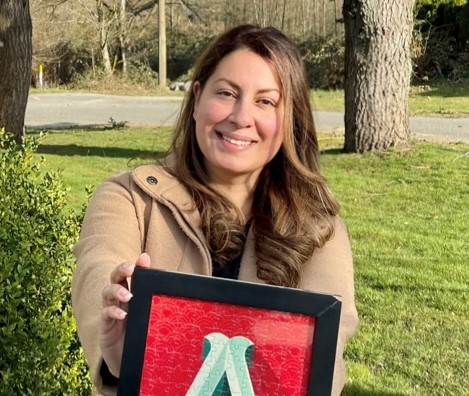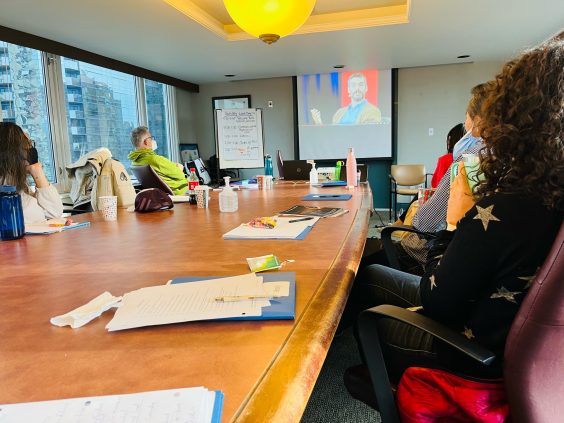Entering palliative or hospice care marks the start of a complex phase of life, for patients and their loved ones. Volunteers at Providence Health Care’s St. Paul’s Hospital Palliative Care Unit and St. John Hospice train for this specialized care.
At Providence Health Care, volunteers at palliative and hospice care sites do a little bit of everything, from offering companionship, assisting during meal times and delivering pet therapy, to sitting vigil during a person’s final hours and supporting bereaved families.

Their goal? To improve the quality of life of patients and families.
“These compassionate individuals sit with patients at the bedside, and offer support to their loved ones. To provide this level of emotional care they must first learn how to listen, to be comfortable with death and dying, and the difficult conversations that surround this phase of life, and how to better care for themselves so they can help others,” says Sara Parmar, coordinator of volunteer resources at St. Paul’s Hospital.
Are palliative and hospice care the same?
In Canada, palliative and hospice care are often characterized in daily life as the same—“places where people go to die”.
This isn’t true, and it’s important to understand the differences.
Palliative care focuses on relieving distressing symptoms related to an illness, and providing physical, psychological, social and spiritual care.
Life expectancy doesn’t play a role in selecting palliative care.
“There is a lot of evidence to suggest that early integration of palliative care alongside disease-modifying therapies actually makes people live longer…when people feel better, they do better clinically…they have more capacity to do things that bring them joy and make life worth living.”
“I can’t guarantee that you’ll need a cardiologist, or an oncologist, or any other ‘ologist in your lifetime. But you know what I can guarantee? You will die. 100% of you will one day die, and therefore could one day benefit from palliative care services,” explains Dr. Lauren Daley, a physician with Providence’s Palliative Care team.
Hospice care is for patients close to the end of life. The focus is on comfort and quality of life, not on prolonging life.
A key part is “to ensure people feel valued, heard, and that their final wishes are honoured. It is so important for folks to have dignity, autonomy, and a sense of control in their dying experience when so much feels out of control,” says Charisse Knowlan, Providence social worker.
Learning the skills to provide support
Volunteering in these spaces is uniquely challenging and carries heavy subject matter. Preparation is key.
“These volunteers already have a strong skillset—and many of them have experienced grief or significant loss—ensuring they are putting their skills to use properly to support patients and their families during this very personal and challenging time, is critical,” says Parmar.
Volunteers must complete an intensive training program. The facilitators are palliative and hospice care social workers, and guest speakers include spiritual health practitioners, current volunteers, and nurses with experience in palliative and hospice care.
They cover a range of topics, including attitudes about death and dying, existential distress, the needs of the dying, the differences of palliative and hospice care, how to support caregivers and family members, listening and communication skills, as well as tools to set boundaries and how to prioritize self-care.
A return to class
After a pause due to the COVID-19 pandemic, November 2022 marked the completion of a training class for the first time in nearly three years.


Parmar is thrilled to see the classes underway, knowing the important role these volunteers will play in supporting patients and families navigating an overwhelming time. And the volunteers feel ready to meet the challenge. One volunteer, who prefers to remain anonymous, shares:
“This training went way above and beyond my expectations. I am very thankful to have taken it because I not only feel like I’m prepared to volunteer in the Palliative Care Unit. But it has also helped me become a better person in general, a better listener, more empathetic and understanding.”
“What has surprised me is how little palliative care has to do with death. The death part is almost irrelevant. Our focus isn’t on dying, our focus is on quality of life.”
– Balfour Mount, pioneering Canadian physician who coined the term “palliative care”
Are you or someone you know interested in volunteering with Providence Health Care? Visit the website for more information and to fill out an application.
This article draws on others from The Daily Scan. To learn more about palliative and hospice care see:
- “5 Common Palliative Care Myths Debunked” by Dr. Lauren Daley
- “Q&A with Dr. Gil Kimel, Head of Palliative Care at Providence Health Care”
- “The Many Hats of a Social Worker”
Story by Breanna Yu





